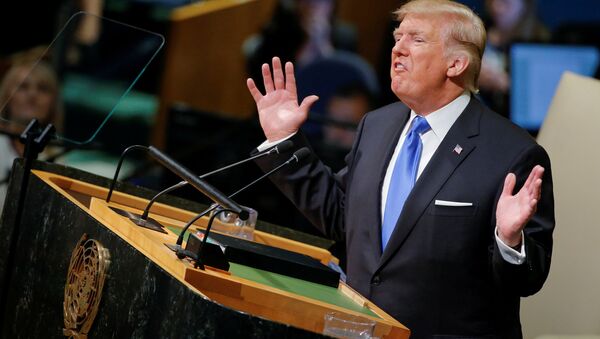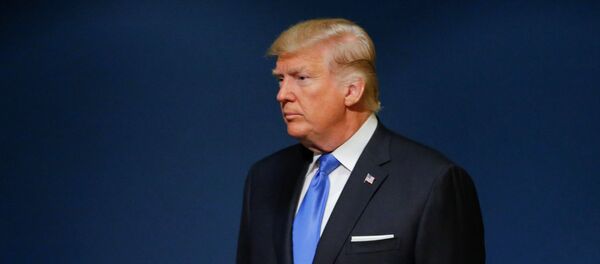US President Donald Trump believes that there is great power in unpredictability, Gordon Flake, CEO of the Perth USAsia Center, an Australian think tank, told Radio Sputnik, adding that while there is some utility from unpredictability "it doesn't work in diplomacy nearly that well."
The US president believes that "as long as he is considered to be the unstable, bombastic and unpredictable one he thinks it will help him in negotiations with friends and foes alike," Flake said commenting on Trump's first ever speech at the UN General Assembly on Tuesday.
The problem with Trump's approach is that no country exists in a vacuum, the scholar noted, explaining that while the US president's threat to "totally destroy North Korea" may or may not have had an impact in Pyongyang, "it certainly had an impact in Moscow… or China, or in other countries" which are seeking to solve the Korean issue.
Flake underscored that "the unpredictable element… undermines support for the United States" among its allies, such as South Korea, Japan and even Australia, and "makes it more difficult for very important partners in this endeavor like China or Russia to cooperate."
"There are lots of checks and balances built in [the US government] system to prevent a preemptive strike by the US," he asserted.
According to Flake, the real danger lies in Pyongyang's potential assertive actions, such as a strike in the direction of Guam, which is home to two US military bases, or an attack against Japan or South Korea, or if a North Korean missile test results in hitting a ship or an airliner. In any of those scenarios the Trump administration may hit back twice as hard.
"The US would not play its traditional role of being the adult in the room… and could be quickly pulled into a conflict," the scholar surmised.
"We are still living in a remarkably surreal environment where Donald Trump as a president would criticize every living being without any sense of loyalty to anybody with two exceptions: his own family and Vladimir Putin," Flake pointed out.
According to the Russian analyst, Trump had repeatedly contradicted himself while delivering the speech, calling upon nations to protect their sovereignty at the same time threatening North Korea with "total destruction" and Venezuela with some sort of "further action." These contradictions may create an unstable and dangerous situation on the world arena, according to Sivkov.
If the Trump administration launches a war against Pyongyang it may lead to a North Korean strike on 25 nuclear reactors in South Korea, Sivkov warned, adding that this would equate to 25 Chernobyl disasters on the Korean Peninsula, compared to which the Fukushima catastrophe is a "firecracker."
On Tuesday, Trump delivered his speech at the UN General Assembly provoking a heated debate among state leaders and international observers.
Apart from praising the US' role in preserving peace and the security of its allies and calling upon nations to team up to tackle global threats such as terrorism and international crime, Trump focused on lambasting a "small group of rogue states" — North Korea, Iran, Cuba and Venezuela.
Claiming that the DPRK's "pursuit of nuclear weapons" poses a threat to entire world, the US president emphasized that "if the US is forced to defend itself and its allies [Washington] will have no choice but to totally destroy North Korea." He also labeled the country's leader Kim Jong Un as a "Rocket Man on a suicide mission."
Cuba and Venezuela also came under Trump's criticism as "corrupt and destabilizing" "socialist dictatorships."
In response to Trump's speech, Venezuelan Foreign Minister Jorge Alberto Arreaza underscored that each country has a sovereign right to maintain the system it chooses. He opined that the US president's rhetoric evokes strong memories of the Cold War.
Venezuelan President Nicolas Maduro hit back harder, calling the US leader's address an "aggression from the new Hitler of international politics."
For its part, DPRK Foreign Minister Ri Yong-ho compared Trump's statement to "dog barking," while Iranian President Hassan Rouhani called the US leader's speech "ignorant, absurd and hateful rhetoric."





